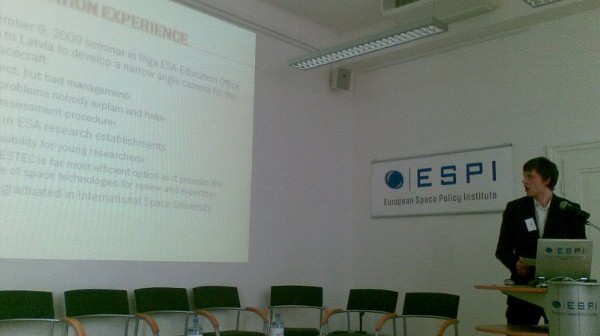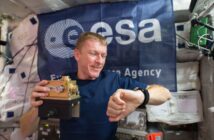On the 23rd of March Vienna hosted a workshop on the enlargement of the European Space Agency. Kosmonauta.net’s representative was also present at this event.
Over the next few years, most of countries from Central Europe and the Baltic region should join the European Space Agency (ESA). This includes Poland, which since the end of November 2011 is negotiating the accession terms. By the end of this decade, ESA could be composed of as much as 29 countries, which is 10 more than today.
The integration process can be a complex task. Currently, most of the ESA-aspiring countries neither have an advanced space industry nor a long-term space policy. On the other side, ESA itself will probably attempt to change its conduct, so new membership states could do more for the development of their space industry. To discuss more on this subject, on the 23rd of March 2012 in Vienna representatives of the following countries met: Poland, Lithuania, Latvia, Estonia, Hungary, Slovakia, Slovenia and two new ESA member states: The Czech Republic and Romania. The meeting was held at the HQ of the European Space Policy Institute (ESPI), which actively supports actions linked to the “strategic” development of the space industry on the Continent. ESA was represented by the: international cooperation program, PECS program and the Education Office. There were also representatives from the business sector, space industry and organizations such as EURISY.
During the workshop presentations were shown on the integration process with ESA, the PECS program and educational projects. Then business and investment representatives have expressed their views on the ESA expansion in the coming years followed by presentations from individual countries from Central Europe and the Baltic Region. The first one to speak were the two “new” member states in ESA: the Czech Republic and Romania. The workshop ended with a roundtable discussion.
Currently the integration process with ESA is implemented on various levels in most of the Central European countries and Baltic states. The only “unknown” is Bulgaria, which recently initiated first talks with ESA. Some countries (the Czech Republic, Romania) have already gained member status, so the benefits of being a full member state could be presented. Other countries such as Estonia or Slovenia are conducting the PECS program. It is expected for them to join ESA in the 2015/2016 timeframe. Later, such countries as Lithuania, Latvia or Slovakia should join the agency – about the year 2018.
ESA insists that the countries mentioned earlier will be satisfied from their space industry development. The term “happy new member state” was coined as a description of a country profiting from being part of ESA. Moreover, it is suggested that the cooperation between member states should increase, for example through an apprenticeship program in various ESA centres. It is the “national training scheme” and 30 persons from ESA-aspiring countries should take part in this practice later this year.
The integration process of the new ESA member states will take at least until the end of this decade. The effects should change the European space industry, which will evolve further, creating new market niches, increase employment, form new firms in the sector and start more joint projects. These are strategic important goals not only for ESA, but for the EU as well, as set by the Lisbon Treaty






